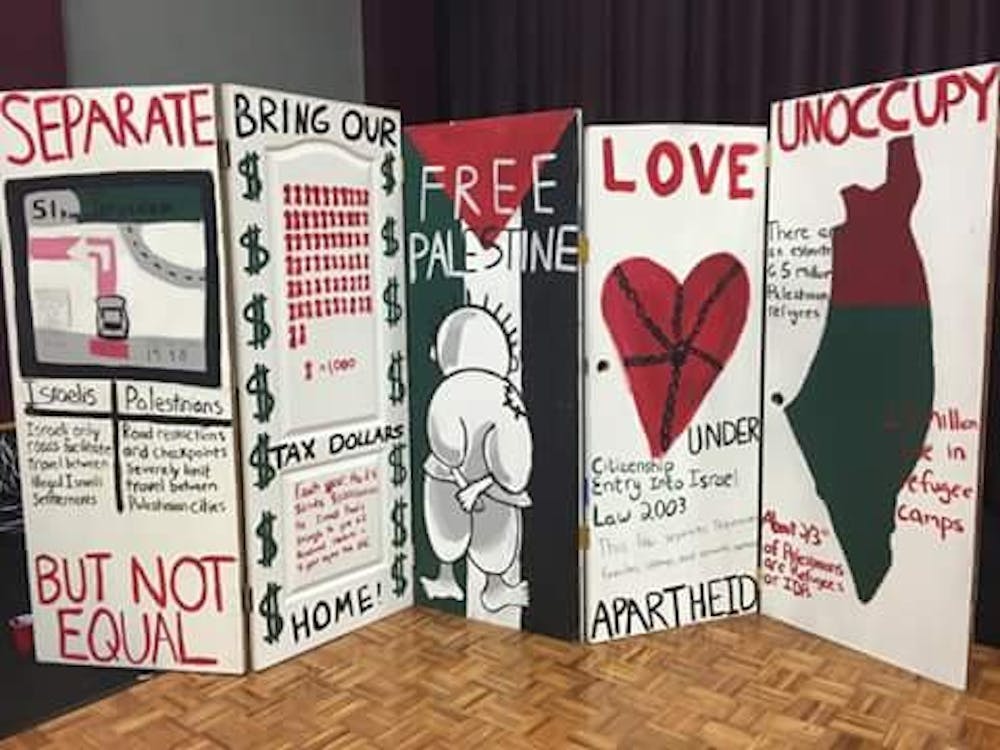Amid the 400-plus student organizations on campus, it is hard for the small ones to get their voices heard. Students for Justice in Palestine (SJP) is among the group of modestly sized organizations that are working hard to establish their presence on campus.
USC’s chapter of SJP is a relatively new one — after a long hiatus, the club started back up only a year ago. Students for Justice in Palestine is a passionate group of students who believe in their cause and in spreading awareness, even if they only have three consistent members.
“We’ve got a lot of people who help out every once in a while, but there’s three of us who do things,” Vice President Cynthia Beavin said. “We want people to know who we are. We want the USC population to be able to see the entire conflict and not just what the media tells us — a lot of what the media tells us is very one-sided.”
SJP wishes to share the entire story of Israeli-Palestinian conflict instead of the common portrayal they believe that the media shows.
“Really, just after World War II, everyone wanted a safe place for Jews to live, and that’s totally fine. But at the same time, when creating that safe place, they ended up removing the people that were already living here,” Dana Al-Hasan, president of USC’s SJP, said to give background.
SJP does not want the Palestinian people to be branded as terrorists by the outside world — an assumption that is all too common. To counter this claim, Beavin uses children’s shoes as a metaphor for the death toll that is actually disproportionately higher in Palestine than in Israel.
“Let’s say you took a pair of shoes and lined them up or put them in a pile for every Palestinian child that died, you would have 500 pairs of shoes, roughly. And you would only have one pair of Israeli shoes,” Beavin said. “And so it’s not meant to say we want more Israelis to die, because we don’t, we don’t want anybody to die. But it's just to show ... we're not giving this the attention it deserves, and you're not being told the truth.”
Their organization is very peaceful in its intent, wishing to spread their message and raise awareness but not cause trouble with students or other organizations on campus. Their Palestinian culture night last semester was a huge success, with nearly 200 members in attendance throughout the night of food, dance, celebration and education.
This semester, SJP will be hosting a play called “My Name is Rachel Corrie.” This play, originally co-edited by recently deceased actor Alan Rickman, tells the true story of an activist from the United States named Rachel Corrie who, when protesting a home demolition in Gaza, was run over by a bulldozer and killed. Her family then sued the Israeli government for a symbolic dollar in the hopes that the government would take responsibility for her death and give her family the justice and peace of mind they desired. The Israeli government denied all responsibility for her death.
“My Name is Rachel Corrie” is a one-woman show in which the martyred activist, played by actress Ashley Malloy, travels to college campuses to spread the word in an artistic and appealing format. The play will be held in Booker T. Washington Auditorium on Feb. 11 at 7:30 p.m. Admission is free for all.
“When you look at students here and anywhere, like the general population anywhere, people are not very interested in politics, especially if it’s something that’s 8,000 miles away,” Al-Hasan said. “So that’s why I’m really excited about the play … it’s still very creative and artsy, but it does tell the story of Rachel Corrie, which I think is a story that really should be told and heard.”

